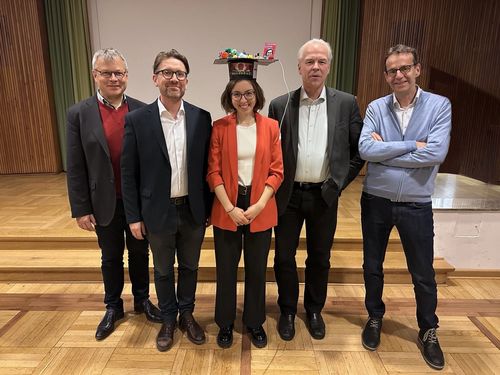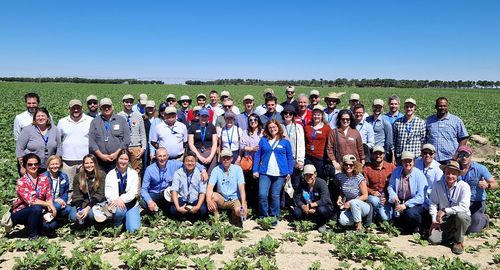News

The Thünen Institute is offering a full-semester course on the CAPRI model during the upcoming summer semester as part of the Agricultural Economics Master’s program at Humboldt University of Berlin. The course is also open to all interested external participants and is supported by members of the…

Wiley has recognised a publication from the Thünen Institute as one of the most frequently cited works of 2023. The study shows the effects of an increasingly plant-based diet on agricultural incomes.

Dr. Ferike Thom has successfully completed her doctorate with distinction. Her research demonstrates how consumer decisions can be more accurately represented in models like CAPRI—incorporating over 900 food categories. An important step toward better dietary recommendations and well-founded policy…

On November 27 and 28, 2024, a workshop on the support of organic farming in Germany took place at the Thünen Institute. The focus was on area-based support payments for conversion to and maintenance of organic farming, which have been granted by the EU, the federal government and the federal states…

The agri benchmark Cash Crop Network, coordinated by the Thünen Institute of Farm Economics, discussed developments in global crop production at its annual conference in Spain. A significant drop in profitability was stated for global arable farming in 2023. The outlook for the current year is also…

agri benchmark is the global network for the analysis of agricultural production systems coordinated by the Thünen Institute of Farm Economics. It is organised by agricultural branches. For the first time, the annual conferences for the beef, sheep, pork and poultry sectors took place in a single…
| Bundesallee 63 | Telephone: +49 531 596 5102 |
| 38116 Braunschweig | Telephone WebEx: +49 531 2570 1637 |
| Fax: +49 531 596 5199 | |
| bw@thuenen.de |
Publications
- 0
Lampkin N, Jahrl I, Reinecke S (2025) Achieving the EU Farm-to-Fork 25% organic target: how can policy support this goal? [online] In: Willer H, Trávnícek J, Schlatter B (eds) The world of organic agriculture : statistics and emerging trends 2025. Frick; Bonn: FiBL; IFOAM Organics International, pp 213-219, zu finden in <https://orgprints.org/id/eprint/55039/> [zitiert am 24.02.2025]
- 1
Zamani O, Chibanda C, Boimah M, Asante-Addo C (2025) Aligning policy for success in developing countries: evidence from the poultry sector of Ghana. Agric Food Econ 13:5, DOI:10.1186/s40100-025-00348-8
- 2
Reiter K, Roggendorf W, Sander A, Scholz J, Schwarze S (2025) Analyse der Inanspruchnahme von Agrarumwelt- und Klimamaßnahmen und des Ökolandbaus : Programm zur Förderung der Entwicklung im ländlichen Raum 2014 bis 2022 in Niedersachsen und Bremen (PFEIL). Braunschweig: Johann Heinrich von Thünen-Institut, xx p, 5 Länder Eval 2025/02, DOI:10.3220/5LE1736501252000
- 3
Duden C, Böhner HGS, Kuhnert H, Lampkin N, Offermann F, Röder N, Tegetmeyer I (2025) Beiträge zur Evaluierung der Öko-Regelungen nach GAP-Direktzahlungen-Gesetz (GAPDZG). Braunschweig: Johann Heinrich von Thünen-Institut, 155 p, Thünen Working Paper 257, DOI:10.3220/WP1736334766000
- 4
Sanders J, Brinkmann J, Chmelikova L, Ebertseder F, Freibauer A, Gottwald F, Haub A, Hauschild M, Hoppe J, Hülsbergen KJ, Jung R, Kusche D, Levin K, March S, Schmidtke K, Stein-Bachinger K, Treu H, Weckenbrock P, Wiesinger K, Gattinger A, Heß J (2025) Benefits of organic agriculture for environment and animal welfare in temperate climates. Organic Agric: Online First, Mar 2025, DOI:10.1007/s13165-025-00493-w







